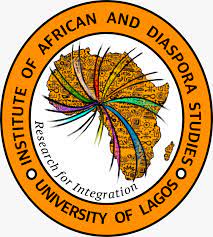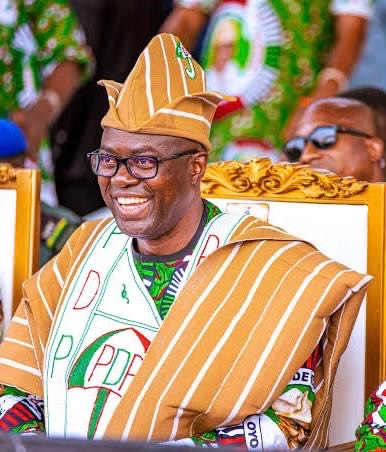NEWS
We now Disseminate Research Findings through Youtube — Institute

The Institute of African and Diaspora Studies (IADS) University of Lagos, says it has broken new grounds with its ability to disseminate research findings by adopting documentary making,
It says it has dymistified the traditional academic method of publishing such findings in journals.
The Director of the centre, Prof.
Muyiwa Falaiye, said these in an interview with the newsmen in Lagos, on Wednesday.He spoke on the sidelines of the fifth anniversary celebration of the centre.
According to him, as the foremost institute of African and Diaspora Studies in Africa, the centre has in the past five years, also recorded other giant strides.
He said it had done so in human capacity building, attracting commendation to the university and Nigeria at large.
“Today, we are celebrating our fifth anniversary as an institute.
“The IADS is five years and we decided that we should mark it, not in a very big way, but just to remind ourselves of the task ahead and to look back to see some of the things we have done and what we can do better in the next five years.
“This institute is the foremost in African Studies, in the continent today. we have been able to do research that have real cutting edge innovations for Africa and Nigeria, and as I speak, there are 30 ongoing research activities here in this institute.
“It may please you to also know that in the five years of existence as an institute, we have come up with innovations that are far from the way things used to be done, especially in the area of research, learning and advocacy.
“One of such ground-breaking innovation is the fact that we have created a new channel of disseminating research findings.
“We have now demystified that by making our research findings available on You tube, through documentary.
“This is nouveau and this is being copied by several other institutes globally, and we have also been able to find the right mix between research, teaching and advocacy.
“In five years, we merged the PhD programme, which is also unprecedented, and a few other things that we have done.
“We are one of the first institutes in the world to adopt documentary making as an avenue to disseminate research findings, which was not the case before,” he stated.
Falaiye noted that the development was contrary to most traditional academic methods, which was to publish research findings in journals that many people do not have access to.
The director stated that starting fellowship programmes, as well as attracting several research grants and creating an opportunity to bring in foreign scholars, had further put the centre on the right track.
He added that the institute had also brought in researchers, both old and young, to advance its course.
According to him, the pot pourri of activities and events going on in the last five years in the institute spanning areas of research, teaching and advocacy, have also seen it mentor young researchers across the country.
The director noted that the entire achievements had impacted the image of both the university, scholarship and the country at large.
“You will be surprised that several visiting scholars have now found home here.
“Those who otherwise, will not like to come to Nigerian universities, now struggle to get access to our institute here, as either visiting fellows, visiting researchers or visiting young scholars.
“This again is nouveau and unprecedented in the history of this country,” he stated.
He, however, said the institute had had its fair share of challenges, especially in the area of funding.
“Our mantra here is, no research without funding. Sometimes, we do not get the kind of funding we need.
“Sometimes too, the challenges confronting Nigeria affect us, we still have issues of power sometimes too, internet connectivity, and issues of the general image or perception of our country out there.
“Few scholars will not want to come this way because of the image of our country outside, thinking it is not a safe place to come to and more.
” All of these sometimes, affect our perception out there, but luckily, those of them who had managed to come here and have been with us for a while, had gone back with beautiful stories to tell.
“They have been able to carry encouraging message about what we do here,” he said.
Speaking further on funding, he said research funding should be left to those outside government, which cannot do everything.
He emphasised the need for institutions to look outside for funding of research, from the industries and from individuals who believed such research could change the perspectives or direction of the industries.
According to him, relying on government for funding of research will not serve anyone any good.
Also speaking, the Vice Chancellor of the university, Prof. Oluwatoyin Ogundipe expressed satisfaction about the achievements recorded so far by the institute, in its five years of existence.
He told reporters that attracting research grants both locally and internationally was a key achievement that had engendered the much needed focus of the centre.
“I want to say that I am highly impressed with what they have done so far within the last five years.
“Attracting research grants both at the local and international levels, as well as bringing in scholars from outside the country and even within, is to say the least, heartwarming and worth commending.
“The centre has always been able to sponsor research, PhD research works and you cannot believe it that even someone from outside the university once got research grant support for the PhD students.
“We have their postgraduate students that are ongoing. So, they have done excellently well but I know we can still do better. In the next five years.
“I want to see a centre that will bring in more scholars from outside the country to come and interact and learn about our culture.
“I want them to also interact and learn in the area of migration. It is not only about physical migration, we also have the social migration, as well as economic migration, that will lead to development,” Ogundipe stated.
Prof. Rahmon Bello, immediate past vice chancellor of the university, on his part, said that the centre project came up during his tenure in the institution.
“I am happy with what I have seen within its five years of existence. We came up with the theme of the concept at the time, with the University of West Indies, after a lecture here in Lagos.
“It came up with this idea and I am happy today that this centre has transformed to reality and it is doing very well.
” What it has been doing in the past years, I want to give kudos to the director and members of the centre and to the current management of the university of Lagos, for keeping the idea afloat and to ensure that they support the centre to make it viral.
” The centre is making waves and I believe in the next five years, it will reach the top of its pinnacle in Africa, and I want to say congratulations to the centre,” Bello said.(NAN)
NEWS
Tinubu Honors Buhari, Renames University of Maiduguri after Late President

By David Torough, Abuja
President Bola Tinubu has approved the renaming of the University of Maiduguri, Borno State as Muhammadu Buhari University.
“May we now adopt the University of Maduguri as the Muhammadu Buhari University,” Tinubu said at the close of a special session of the Federal Executive Council held to honour Buhari at the Aso Rock Villa, Abuja on Thursday.
The President paid a glowing tribute to Buhari, describing him as “a good man, a decent man, an honourable man” whose legacy of discipline, patriotism and moral uprightness would endure for generations.
Tinubu said although the late president was not without flaws, his unwavering commitment to national service set him apart.
“President Buhari was not a perfect man, no leader is, but he was, in every sense of the word, a good man, a decent man, an honourable man.
“His record will be debated, as all legacies are, but the character he brought to public life, the moral force he carried, the incorruptible standard he represented, will not be forgotten.
“His was a life lived in full service to Nigeria, and in fidelity to God,” he said.
Reflecting on Buhari’s time in office and his long military and civil service, Tinubu praised the late leader’s simplicity, humility, and stoic resistance to the trappings of power.
He said, “He stood, always, ramrod straight; unmoved by the temptation of power, unseduced by applause and unafraid of the loneliness that often visits those who do what is right, rather than what is popular.
“His was a quiet courage, a righteousness that never announced itself. His patriotism lived more in action than in words.”
Tinubu also recounted their political alliance, which culminated in the historic 2015 elections that marked Nigeria’s first democratic transfer of power from one ruling party to another.
“We stood together, he and I. Alongside others drawn from across the political spectrum, regions and tongues, we formed an alliance that enabled Nigeria to experience its first true democratic transfer of power from one ruling party to another.
“When he was sworn in as our party’s first elected President, he led with restraint, governed with dignity, and bore the burdens of leadership without complaint,” he said.
The President expressed admiration for Buhari’s post-office modesty, noting that he returned to his hometown, Daura, without seeking to wield influence behind the scenes.
“When his tenure ended, he returned to Daura; not to command from the shadows or to hold court, but to live as he always had, never seeking to impose his will but content to let others carry the nation forward.
“Even in death, he maintained the serenity that defined him in life: not a sigh, not a groan, just a quiet submission to the will of God. Such was the man Nigeria has lost. Such was the man for whom our nation now mourns,” he added.
Tinubu thanked the Inter-Ministerial Committee and Katsina State Governor, Dikko Radda, for organising a befitting state funeral within 48 hours, describing it as a “profound honour” to lead the burial procession in Daura.
He concluded his tribute with a prayer: “Mai Gaskiya, the People’s General, the Farmer President, your duty is done. May Almighty Allah forgive his shortcomings and grant him Aljannah Firdaus. May his life continue to inspire generations of Nigerians to serve with courage, conviction, and selflessness. President Buhari, thank you. Nigeria will remember you.”
Buhari died on Sunday, July 13, at the age of 82.
NEWS
C’River First Female NUJ Chairman Describes Tenure as Trial Period

The first female Chairman of the Nigeria Union of Journalists (NUJ) in Cross River, Archibong Bassey has said that her first tenure in office was a trial period.
Bassey, who was returned unopposed in council’s election, made the assertion in an interview on Thursday in Calabar.
The Bassey- led executive was first elected on 9th May 2025, to complete the tenure of Nsa Gill, who was then appointed as Chief Press Secretary to Gov.
Bassey Otu.The chairman, who thanked the members for keeping faith in her and her team, said that she would improve on her achievements while correcting any mistakes she might have made in her first tenure.
She pleaded that any member who she must have offended in the course of her leadership should forgive her as she was not perfect and called for unity among members.
“Let’s leave any form of rancour behind, I need all your support;push me from the back, support me as you can.
‘’Tell me your ideas of moving the council forward and not what someone told you about me; I am asking God for the spirit of humility and love, to enable me lead the council well.’’
Earlier in his goodwill message, Dr Erasmus Ekpang, Cross River’s Commissioner for Information, had commended the union’s unity in electing its new executives.
According to Ekpang, they will continue as a government to give the Cross River Council of NUJ what it needs and all the necessary support to enable it carry out its functions objectively.
“I want to thank you for your unity, it’s better to come unopposed, I believe one day, the Cross River Council will emerge as the best in the nation,” he said.
Other executive members who were returned unopposed are Mr Sunday Inah of the Cross River Broadcasting Corporation (CRBC) as Vice Chairman, Michael Abang of Business Day as Secretary.
Others are Kingsley Agim of the Cross River Ministry of Information as Assistant Secretary, Mrs Achiane Adams of the Ministry of Information, Treasurer, and Benedine Tete Anam of the Federal Radio Corporation of Nigeria (FRCN), Auditor.
NEWS
Gov Makinde Confered With Prestigious Chieftaincy Title of Aare Omoluabi of Akure Land by Akure Kingdom

The Akure Kingdom will today bestow a prestigious chieftaincy title, Aare Omoluabi of Akure Land, meaning President of the Respectable People, upon His Excellency, Governor Seyi Makinde of Oyo State.
The conferment ceremony, which will take place in Akure, Ondo State, marks a significant recognition of Governor Makinde’s exemplary leadership, integrity, and contributions to the advancement of Yoruba culture and national development.
The title, one of the highest honors in the Akure Kingdom, celebrates individuals who embody the virtues of respect, dignity, and service to humanity.
Governor Makinde’s conferment reflects his outstanding commitment to good governance, infrastructural development, and fostering unity across Nigeria.
The ceremony will be attended by traditional rulers, dignitaries, and government officials, underscoring the significance of this historic event.
This honor further strengthens the bond between Oyo and Ondo States, fostering mutual respect and cooperation for the progress of the Yoruba nation and Nigeria at large.


























